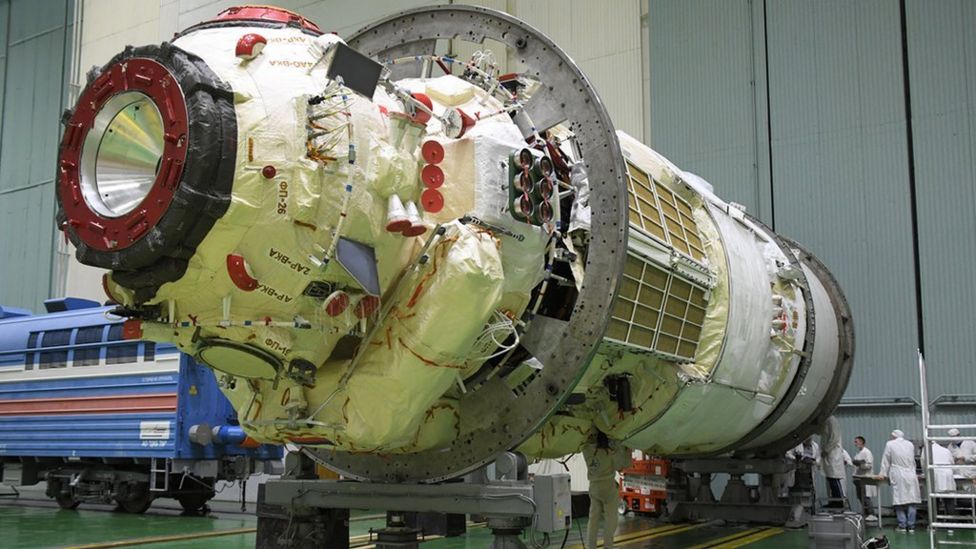
“A Russian rocket has departed the Baikonur Cosmodrome, Kazakhstan, to deliver a new science module to the International space station (ISS).
The 13m-long, 20-tonne Nauka laboratory will go on the rear of the orbiting platform, connected to the other major Russian segments, Zvezda and Zarya.
The new module carries with it a large robotic arm (ERA) supplied by the European Space Agency (Esa).
Nauka is much delayed. It was originally supposed to launch in 2007.
But it suffered repeated slips in schedule, in part because of budget difficulties but also because engineers encountered a raft of technical problems during development.
The module will result in a significant boost in habitable volume for the ISS, raising it by 70 cubic metres.
Cosmonauts will use the extra space to conduct experiments and to store cargo. They’ll also use it as a rest area.” BBC
Comment: There has been much fretting lately over the thought that Russia will abandon cooperation in space in favor of cooperation with China. What does this mean in terms of that speculation? pl

President Putin places a premium on being reliable, and discharging commitments. They said that they would supply this module, and persisted despite stupifyingly dumb sanctions against Russia imposed to support the Russia, Russia, Russia narrative and the accompanying gross slanders against their nation’s honor. Tells you something that they discharged their contractual obligations wirh the “non-agreement capable” West, their “partners”.
Putin always seems to play a long game, allowing options to remain open. So why would he foreclose the option for better relations somewhere down the line with the West, and put all of his eggs in one basket with the Chinese? It is in Russia’s current i
nterest to profit from trade with China, particularly as trade with the West is not on.
I don’t know this for a fact, but I don’t know that any entity in the West has the capacity to boost such a large payload to the ISS, so that sends a message right there. The future of the ISS may lie in continued participation of Russia, let alone in other more ambitious space ventures such as interplanetary travel, or exploitation of resources elsewhere in the Solar System.
It’s a daunting task, and a pressing one in my estimation, vital for the future of humanity, so to not involve them would be grossly stupid. Yet this level of stupidity is not something we can put past Our Elites, particularly the Little Hat Tribe, who unfortunately exert such an outsized influence over our affairs foreign and domestic, and have such a bug up their ass regarding Russia. They need to sit down, and let us (still fractious, unfortunately) White Gentiles get smart and work together for the good. Otherwise, Russia will definitely be forced to turn their backs on us, and partner with China exclusively (and whoever else might join with them).
Matters are at a critical juncture; if the European Court of Human Rights chooses to blow off their suit against the criminal acts of the Ukrainian regime against their citizens of Russian ethnicity and culture, relations with the West other than those purely commercial (such as Nordstream) will founder. This would be a supreme mistake, and the knock-on effects destructive for an indeterminate span of time.
The Nauka bird is still a mess. They had a problem starting the engines yesterday but seem to have overcome that. I hope they can get it docked without breaking anything. You have to wonder how much we have contributed to their problems through sanctions.
Dear JJ,
SpaceX is nearing re-achieving a launch capacity of the Saturn 5 in the next few years that NASA achieved half a century ago, and in five or so years China’s Long March 9 will have a similar LEO payload. Russia is far more economic due to economy of scale on their launchers and a very mature technology, whereas SpaceX seems to be suckling heavily at the taxpayers teat (NASA pays 4 times the commercial rate, and was recently contracted at double ULA for the FalconX 337 million to purportedly cover infrastructure upgrades (!) ).
Dear Colonel,
The ISS is scheduled to deorbit in six or so years, the west has no plan for a followup, and once it does (if congress and the president could agree and maintain agreement for more than two years), it will take another five to ten years to get it assembled in orbit. So we are talking three to four changeable and agreement-incapable US administrations that remain consistently hostile to Russia and like to play military chicken against Russia’s EW and AirDefenses (one sneeze from a small war). (As a US government contractor, SpaceX is part of US wind vane politics).
Logically, given the time horizon of space projects – 10-20 years – and the non-agreement capable behavior of the US in recent decades, China makes strategic sense. I am sure Russia will do business with the US (they sell more oil to the US now then before sanctions ), cash up front, but Russia would be ill advised to base its strategic longterm space plans on US space plans – such as they are – I recall how Bush declared what a decade ago that we would land a man on Mars and then allocated no money.
ISL
Scheduling and reality are different things.
Indeed, best laid plans of mice and . . .
So far China has been beating Murphy’s odds in their space endeavors (or we are not hearing about their accidents and thus they are twice as determined). Musk is very experienced at missing deadlines (which also always seem horridly unrealistic). Russia – well the module was very very late, but their hypersonic missiles and EW and S-500 seem on time, so perhaps its been a lack of enthusiasm. Maybe their contract allowed them to only string it out so long….